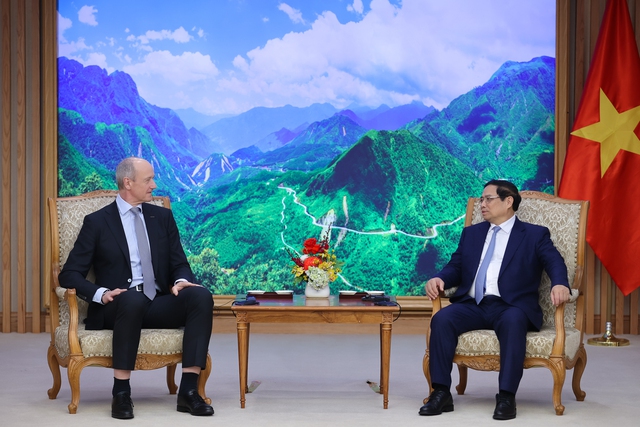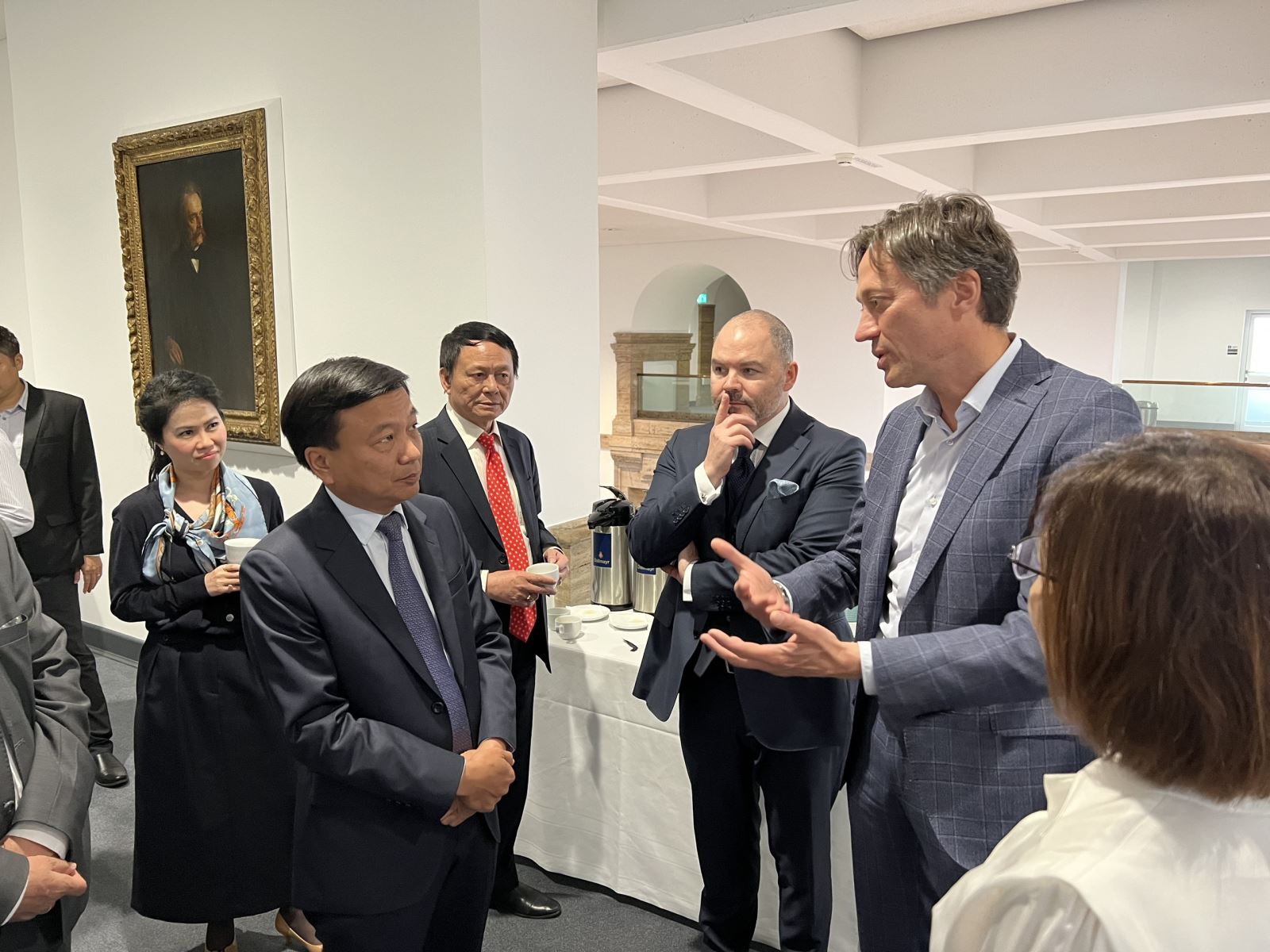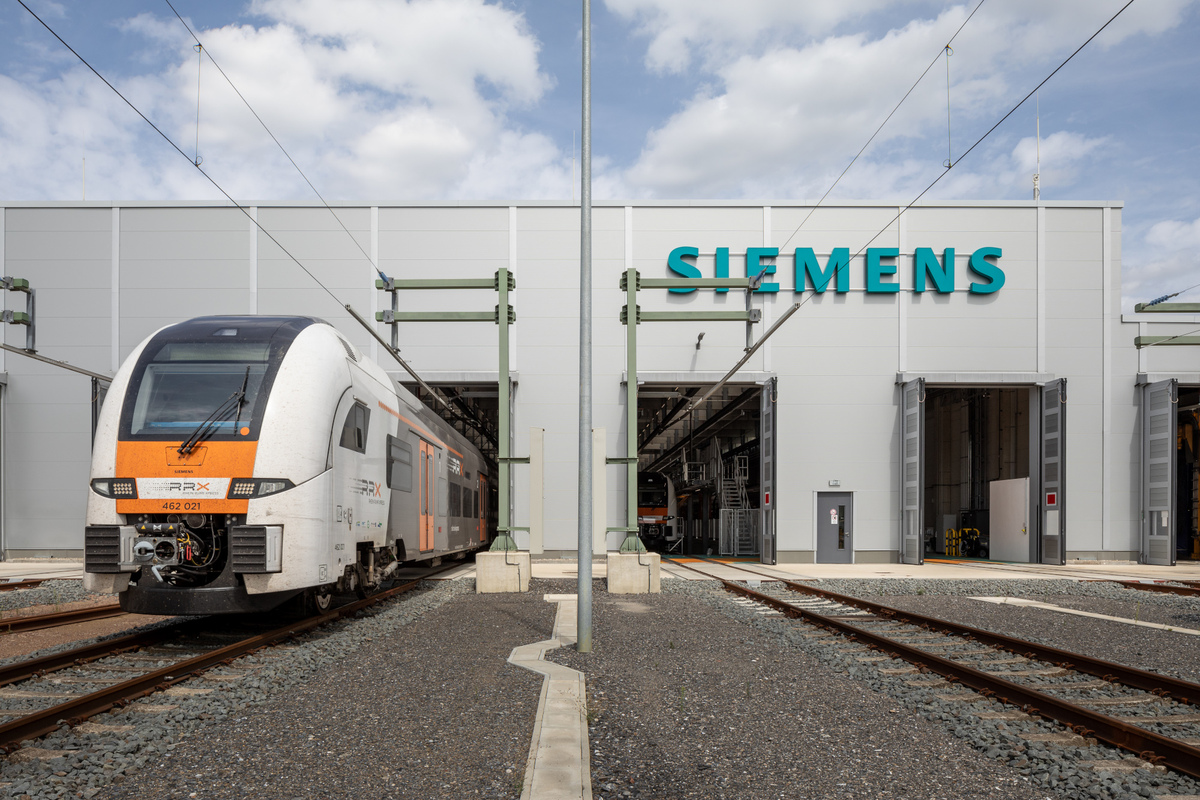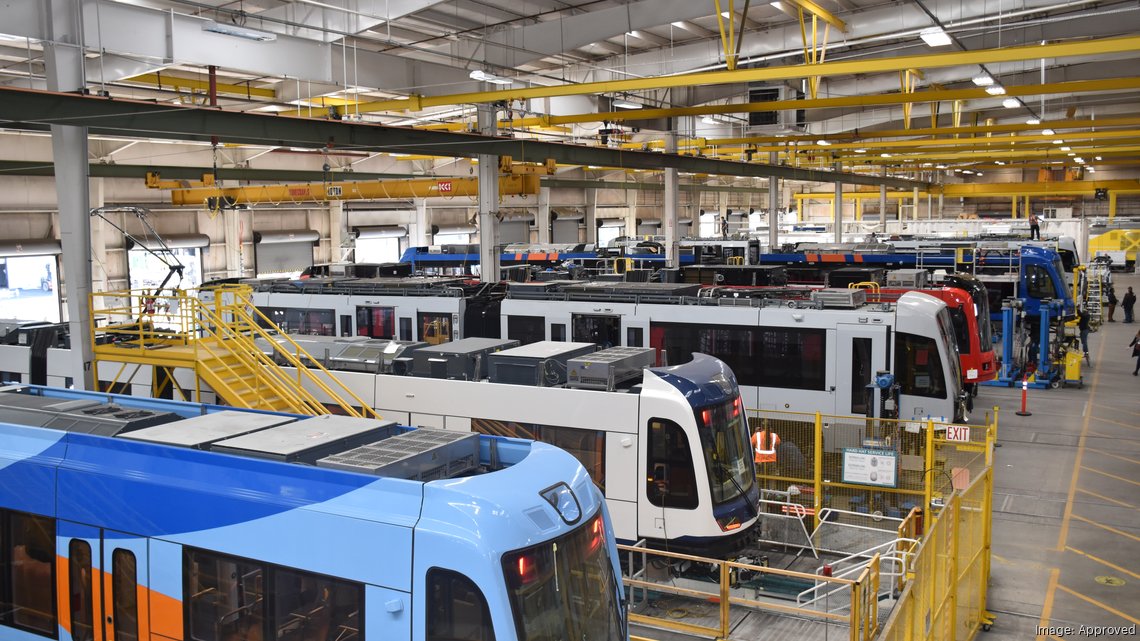Vietnamese Prime Minister Pham Minh Chinh meets with Chairman of Siemens Group (Germany)
On the afternoon of February 26, at the Government Office, Prime Minister Pham Minh Chinh received Mr. Roland Busch, Chairman and CEO of Siemens Group (Federal Republic of Germany) who is visiting and working in Vietnam.
The Prime Minister proposed that Siemens study to participate in a number of urban railway construction packages in Vietnam, such as the Metro Line 2 project in Ho Chi Minh City; technology transfer, and railway industry development (such as metro tunneling).

Prime Minister Pham Minh Chinh with Siemens Chairman. Photo: VGP/Nhat Bac
Thank you Prime Minister Pham Minh Chinh for taking the time to meet with Siemens Chairman Roland Busch. Siemens is interested in high-speed rail projects in North-South and can provide solutions for locomotives, coaches, railway signaling systems, as well as technology transfer for coach manufacturing.
He said Siemens is actively cooperating and wants to continue to expand cooperation, investment, and business in areas and topics mentioned by the Prime Minister, such as high technology, digital transformation, green transformation, modern transportation systems, high speed…, including cooperation in human resource training, supporting Vietnamese enterprises to go global.
Relationship between Siemens and Vietnam
Siemens is a large German corporation with extensive experience and advanced solutions in the industrial, healthcare, transportation, and smart infrastructure sectors. The group has 320,000 employees and global revenue of 78 billion euros by 2023.
In Vietnam, Siemens established representative offices since 1993, with 3 branch representative offices in Hanoi, Da Nang, Ho Chi Minh City, and a manufacturing plant in Binh Duong.
Siemens cooperates with Vietnam in many fields, especially renewable energy and transportation. Siemens has participated in estimated 1 billion kWh of solar power projects contributing to the national electricity system every year; is a leading supplier of efficient power transmission solutions, has provided equipment and solutions for protection and automation for hundreds of 110 kV-220 kV substations and dozens of 550 kV substations in Vietnam; promote automation and digitization in Vietnam such as helping Saigon Newport maximize productivity, reduce ship release time….
In terms of transportation cooperation, Siemens has collaborated with Vietnam in projects such as modernization of Vinh railway signal information system, designing and supplying 16 diesel locomotive units for Vietnam Railway Corporation; lighting system project at Noi Bai Airport; automatic cargo handling system project at Tan Son Nhat Airport, Ho Chi Minh City urban railway project.
In the field of energy, the Ministry of Industry and Trade and Siemens signed an MOU on infrastructure development in the gas and renewable energy fields.

Deputy Minister Nguyen Danh Huy exchanges with Siemens leaders and experts. Photo: Ministry of Transport
In May 2023, an inter-agency working group led by Deputy Minister of Ministry of Transport Nguyen Danh Huy visited and learned about the reality, investment experience, management, and operation of high-speed railways in Germany.
Here, the working group worked with Siemens Group. Senior experts from Siemens shared an overview of Siemens Mobility; locomotive and coach solutions for appropriate train types; signaling information solutions, train control, ETCS system.
Siemens’ class in the global railway field
Siemens has played an important role in shaping the technological evolution in Germany, Europe, and around the world for more than 170 years.
On May 28, 2022, Siemens announced that it had won the largest contract ever to build one of the world’s most advanced high-speed rail networks for Egypt.
The contract is worth a record-breaking 8.1 billion euros with provisions for delivering 41 high-speed trains, 94 regional trains, and 41 locomotives. In addition, 8 stations will also be built with a 15-year maintenance contract.

Siemens factory. Photo: Siemens

Image of a completed light car to Siemens. Photo: Bizjournals
With Siemens’ latest technology, Egypt will own the world’s 6th largest and most advanced railway system, reducing CO2 emissions by 70% compared to current bus and car use. The railway network will connect 60 cities in Egypt, with high-speed trains capable of speeds up to 230km/h.
By January 25, 2023, Siemens announced signing the largest ever order from Indian Railways, producing 1,200 electric locomotives over 11 years, as well as performing repair and maintenance for 35 years.
This agreement is worth 3 billion euros, producing 1,200 electric locomotives for freight transportation, with a capacity of 9,000 horsepower, able to haul up to 4,500 tons of cargo at speeds up to 120 km/h.
The Ministry of Transport is soliciting opinions on three North-South railway scenarios, including two scenarios of 350 km/h passenger trains and reserve freight trains.
Scenario 1 is to invest in new construction of the North-South high-speed railway line, double-track, 1,435 mm gauge, 1,545 km long, designed speed of 350 km/h, 17-ton load per axle, only operating passenger trains. The existing North-South railway will be upgraded to specialize in transporting goods, tourist passengers, and short-haul passengers. The total investment capital is around $67.32 billion.
Scenario 2 is to build a new double-track North-South railway line, 1,435 mm gauge, 22.5-ton load per axle, running both passenger and freight trains, designed speed of 200-250 km/h, with freight train running at a maximum speed of 120 km/h. The existing North-South railway will be modernized to specialize in the transportation of goods, tourist passengers, and short-haul passengers. The total investment capital is around $72.02 billion.
Scenario 3 is to invest in a double-track North-South railway line, 1,435 mm gauge, 22.5-ton load per axle, designed speed of 350 km/h, operating passenger trains and reserves for freight transportation when needed. The total project investment capital is about $68.98 billion. If investing in infrastructure, equipment, vehicles to operate North-South freight trains, the project’s investment capital is about $71.69 billion.












